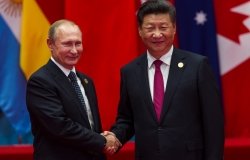Wilson Center President and Director Lee H. Hamilton's opinion piece on the US' North Korea policy.
Tensions ease, doubts remain
From the Indy Star
Fifty-five years ago today, Americans went to the polls and elected Dwight Eisenhower president. He pledged to "bring the Korean War to an early and honorable end." Today, without a formal end to the war, we are still confronting the security challenges that conflict spawned.
No challenge is greater than North Korea's nuclear weapons program. The Democratic People's Republic of Korea's nuclear program threatens not only regional peace and stability, but also the international non-proliferation regime that has served the world so well. This made North Korea's February announcement that it would shut down and seal the Yongbyon nuclear facilities and accept international inspectors one of the most welcome recent developments in U.S. foreign policy. On July 14, after receiving 6,200 tons of heavy fuel oil, North Korea finally delivered on its promise.
The 6,200 tons of HFO -- courtesy of South Korea -- were the first installment of the 50,000 tons pledged in exchange for Yongbyon's deactivation. North Korea will ultimately receive 1 million tons of HFO if it adheres to the February Agreement's other terms, which include disclosing all its nuclear activities, and the deactivation and irreversible dismantlement of all its nuclear weapons.
Beyond energy and humanitarian assistance, North Korean cooperation could lead to its removal from the list of state sponsors of terrorism, modifications of U.S. restrictions on North Korean financial dealings, and, ultimately, normalized relations -- all contingent on verifiable and irreversible nuclear disarmament. But there are no guarantees of success, especially with a regime as odious, mercurial and intransigent as North Korea's.
As Assistant Secretary of State Christopher Hill told members of Congress last month, this is a "step-by-step process. As we achieve each step, it does not mean we've achieved our goal."
This turn of events, however, is not welcome news to everyone. Both inside and outside the administration, many have criticized President Bush's commitment to engagement, accusing him of rewarding North Korea's bad behavior.
But this change of course is a significant improvement over that of the previous six years. Bush's new flexibility on direct engagement and aid is paying small dividends, albeit only after North Korea added two to five bombs' worth of fissile material to its stockpiles, according to International Atomic Energy Agency estimates.
American diplomats and their partners in the Six Party talks engaged in dogged and patient diplomacy. China, North Korea's neighbor and chief patron, accepted a larger role in negotiations -- one befitting an emerging power. American diplomats also made headway in bilateral talks with the North Koreans in January -- entered into without preconditions -- which helped pave the way for the February agreement. There were moments of frustration, anger and irritation. But such are the trials of diplomacy. There is much more wrangling ahead, and the parties have much to clarify.
There are still many unanswered questions surrounding September's Israeli air strike on what some claim was a Syrian nuclear facility under construction with North Korean support. We should wait for all the facts, but for now, the framework for engaging North Korea should not change. The potential for progress is greater now than it was one year ago. The alternative approach of not talking to the DPRK was employed for six years, with only more North Korean nuclear material to show for it.
We must maintain the formula of relying heavily on the Six Party talks, but at the same time be willing to engage in bilateral diplomacy. This requires the United States to walk a tight rope, for we must delicately pursue our own interests while defending those of our allies -- for instance, Japan, which rightfully wants answers to questions about North Korean abductions of Japanese citizens in the 1970s and 1980s.
The biggest challenge will be verification, including what happens to the stockpiles of fissile materials. North Korea must come clean and give up the nuclear bomb. The "Hermit Kingdom" is peerless when it comes to secretive and misleading behavior, and we cannot afford to take it at its word. Doubts do, and should, remain about North Korea's commitment to disarmament, but a tense situation has been slightly relieved. We should stay the course and not let critics undermine recent advances.
Hamilton is the director of the Woodrow Wilson International Center for Scholars in Washington, D.C., and director of the Center on Congress at Indiana University. He served as a U.S. representative from Indiana from 1965 to 1999.
Related Programs

North Korea International Documentation Project
The North Korea International Documentation Project serves as an informational clearinghouse on North Korea for the scholarly and policymaking communities, disseminating documents on the DPRK from its former communist allies that provide valuable insight into the actions and nature of the North Korean state. It is part of the Wilson Center's History and Public Policy Program. Read more

Hyundai Motor-Korea Foundation Center for Korean History and Public Policy
The Center for Korean History and Public Policy was established in 2015 with the generous support of the Hyundai Motor Company and the Korea Foundation to provide a coherent, long-term platform for improving historical understanding of Korea and informing the public policy debate on the Korean peninsula in the United States and beyond. Read more










